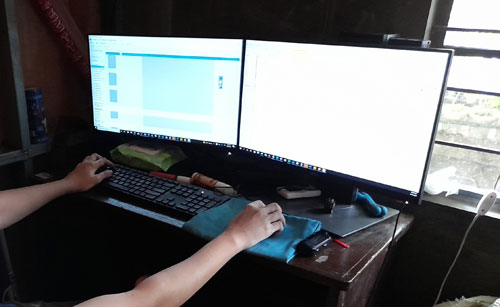The work-from-home (WFH) and hybrid work arrangement will help create 1.1 million new direct jobs for Filipinos, generate billions more in revenue and significantly increase the industry’s countryside footprint by 2028, the Information Technology and Business Process Association of the Philippines (IBPAP) yesterday said.
In welcoming the government’s decision to allow 100 percent WFH, Jack Madrid, IBPAP president, said the paper transfer of the registration of information technology and business process management (IT-BPM) enterprises from the Philippine Economic Zone Authority to the Board of Investments will not involve physically relocating their operations or giving up the incentives that they are currently enjoying.
“WFH/hybrid work is a gamechanger for the Philippines and the sustainability of the IT-BPM industry,” Madrid said.
IBPAP has been voicing the industry’s support for WFH and hybrid work since 2020.
While it started out as an expedient measure in response to nationwide lockdowns, it very quickly ushered in a new era of work for the sector — reinforcing the industry’s agility and resilience.
The Department of Labor and Employment (DOLE) on Monday pressed private establishments to continue adopting work-from-home schemes provided they are mutually agreed upon by employers and employees.
WFH, the Labor Department said, will “help sustain the country’s economic recovery.”
Under the DOLE order, the terms and conditions of telecommuting shall not be less than the minimum labor standards, and shall not in any way diminish or impair the terms or conditions of employment contained in any applicable company policy or practice.
It also provides that the work performed in an alternative workplace shall be considered as work performed in the regular workplace of the employer.
DOLE said an employee is required to be on duty and the work performed in the alternative workplace shall be counted as hours worked.
It also stressed that telecommuting employees are not considered field personnel, except when their actual hours of work cannot be determined with reasonable certainty.
The order also said the employers shall ensure that telecommuting employees are given the same treatment as those employees working at the employer’s regular workplace.
These include rules and policies on rate of pay, night differential pay, overtime pay, authorized hours of work, right to rest days, regular holidays, and special non-working days; and equivalent workload and performance standards of comparable workers at the employer’s premises.
Telecommuting workers should also have the same access to training and career development opportunities; receive appropriate training on the technical equipment at their disposal, and the characteristics and conditions of telecommuting; and possess the same collective rights as the workers at the employer’s premises.
The Philippines is experiencing “The Great Reshuffle” where employees leave their jobs in search of more fulfilling roles that provide the flexibility.
This as the number of Filipinos working from home, on gig, has reached 1.5 million, juggling two to three jobs at one time.
Citing the 2021 Global Talent Survey, JobStreet said 67 percent of Filipino employees have chosen to prioritize their health and well-being over work while 53 percent would prefer keeping a remote work set-up even if it entails additional 10 hours of extra work per week.
Some 41 percent would accept a lower salary as long as they can move to a more affordable location.





